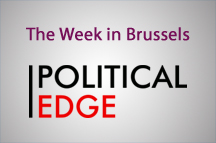 The week started with the EU27 leaders approving guidelines for the Brexit negotiations. Draft versions had been circulating for some time before their adoption, and their final version contained no surprise. The EU27 confirmed their two-phased approach to Brexit talks: deal with the past first (i.e. financial commitments and EU/UK expatriates), and only when sufficient progress has been achieved can work on the future EU/UK relationship begin. Ireland also achieved a diplomatic coup, in the form of a declaration accepted by the other 26 leaders that, should Northern Ireland unite with the Republic, it would automatically rejoin the EU.
The week started with the EU27 leaders approving guidelines for the Brexit negotiations. Draft versions had been circulating for some time before their adoption, and their final version contained no surprise. The EU27 confirmed their two-phased approach to Brexit talks: deal with the past first (i.e. financial commitments and EU/UK expatriates), and only when sufficient progress has been achieved can work on the future EU/UK relationship begin. Ireland also achieved a diplomatic coup, in the form of a declaration accepted by the other 26 leaders that, should Northern Ireland unite with the Republic, it would automatically rejoin the EU.
The 27 only took a few minutes to approve the guidelines, a fact that EU leaders were quick to underline. Credit for this carefully choreographed display of unity goes to Donald Tusk, who has discreetly and effectively shepherded shell-shocked member states since the referendum last June. By the end of the summit on Saturday, there was a palpable sense in Brussels that it had been a success: the EU27 had achieved unity and acted quickly to preserve their interests by agreeing tough negotiating guidelines. More conciliatory comments coming from across the Channel over the last few weeks suggested that perhaps a more mature phase in the divorce was about to begin.
An article on Sunday in the Frankfurter Allgemeine Sonntagszeitung giving an unvarnished account of the dinner hosted by Prime Minister Theresa May for Commission President Jean-Claude Juncker quickly shattered that notion. Regardless of what was actually said (or not said) at dinner, officials in Brussels have been astonished by the speed at which the issue escalated in London: dismissed initially as ‘Brussels gossip’, the article was described soon after as an attempt by the EU to meddle in the British general election (a notion that will play well with potential Tory voters). By Thursday Donald Tusk was calling for calm and moderation, and reminded everyone that the talks will be difficult enough without this distraction.
For anyone trying to make sense of the political process, this spat over a dinner in London illustrates a few points. At times EU officials cannot resist the temptation to score political points against recalcitrant counterparts. In turn, national leaders negotiate in the EU with one eye on domestic politics, and Brussels can be a convenient whipping boy back home. This will make for much drama in the talks. And in order to assess progress in the negotiations, it will be important to focus on their general direction of travel rather than newspaper headlines. The starting point for the process is also radically different in Brussels and London: May speaks of making a success of Brexit, while officials in Brussels (as Martin Selmayr underlined in a POLITICO interview this week) think that it can never be a success as that would fundamentally threaten the EU’s existence. Squaring that circle is going to require many more dinners in London and Brussels.












